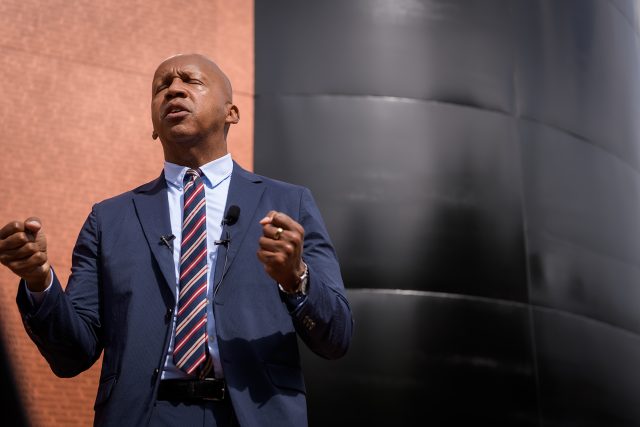
Six years after the Equal Justice Initiative (EJI) opened its groundbreaking National Memorial for Peace and Justice and its Legacy Museum on the same day, the organization is expanding its footprint in Montgomery with projects that are bringing tourists and construction crews to stagnant pockets of the old downtown.
The latest installation is the Freedom Sculpture Park on the Alabama River, a trail of art and exhibits that describe the experiences faced by the men, women, and children trafficked by riverboat and railroad to the city’s slave auctions.
The new park adds layers to the stories told at the National Memorial for Peace and Justice, which recognizes more than 4,000 victims of lynching, and the Legacy Museum, which connects history from the transatlantic slave trade through Jim Crow to mass incarceration.
Travelers are coming to see and hear those hard lessons.
“It’s a lot to take in,” said Lindsey Winand, who teaches high school biology in Baltimore, after visiting the three sites last month. “It’s very emotional. But it’s worth it. Most people need to come and see it. You need to learn the history. You need to learn what’s going on to understand how we got from back in the day to where we currently are now.”
Winand was part of a group of teachers from Baltimore that organizes annual visits for educators and students.
Brenda Tarrant, a teacher at Baltimore City College, the nation’s third oldest public high school, toured the Legacy Museum for the fourth time.
“I’m never any less impacted by how profound the story of African Americans in this country are told by this museum,” Tarrant said.
“The more I learn, the more hurt I become,” Tarrant said.
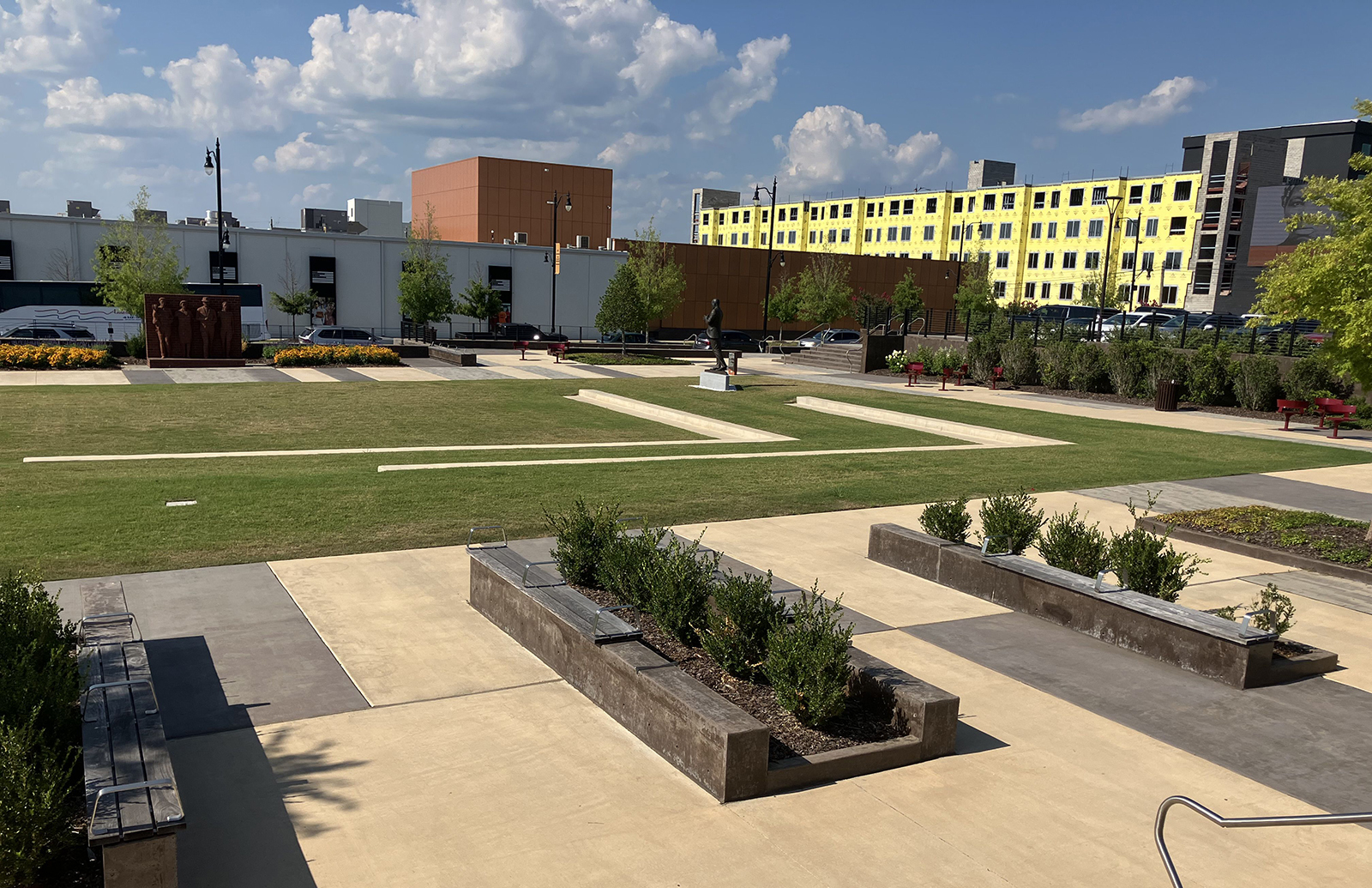
New Construction
Two new hotels are rising behind the expanded version of the Legacy Museum, which opened in 2021. Across the street, EJI is developing two new restaurants by the Legacy Plaza, which opened in 2022 to give people a place to sit in the shade or stroll by the sights and enjoy the views of downtown, including new statues of Rosa Parks and Martin Luther King Jr.
Atop Cottage Hill, near EJI’s National Memorial, construction crews are turning a long-abandoned shell of a building into a hotel and meeting place for EJI visitors.
Those projects follow several other new hotels, including the Springhill Suites and the Trilogy Hotel on Coosa Street just across from the original site of the Legacy Museum, now called the Legacy Annex.
EJI turned an old Montgomery Water Works facility on Court Street into Legacy Hall, a stately brick building where groups can meet or enjoy a meal.
“We can get several hundred people in there and provide a meal in the middle of the day and do all the things that allow a successful meeting to take place over the course of a day or two,” EJI Executive Director Bryan Stevenson said.
Stevenson, who started EJI in the 1980s as a not-for-profit law firm to represent death row inmates, did not expect all the growth when the National Memorial and the Legacy Museum opened in 2018.
“We were really just trying to create a space where we could talk about parts of our history that I don’t think have been adequately addressed,” Stevenson said. “I had no idea that things would evolve in the way they’ve evolved over the last several years. I’m really excited about it. And it’s very energizing to imagine creating this place where hundreds of thousands of people are now visiting to have this immersive experience.”
Stevenson said when he moved to Montgomery in the 1980s that he was struck by the absence of any acknowledgement of slavery in the city that was a hub of the slave trade and the first capital of the Confederacy.
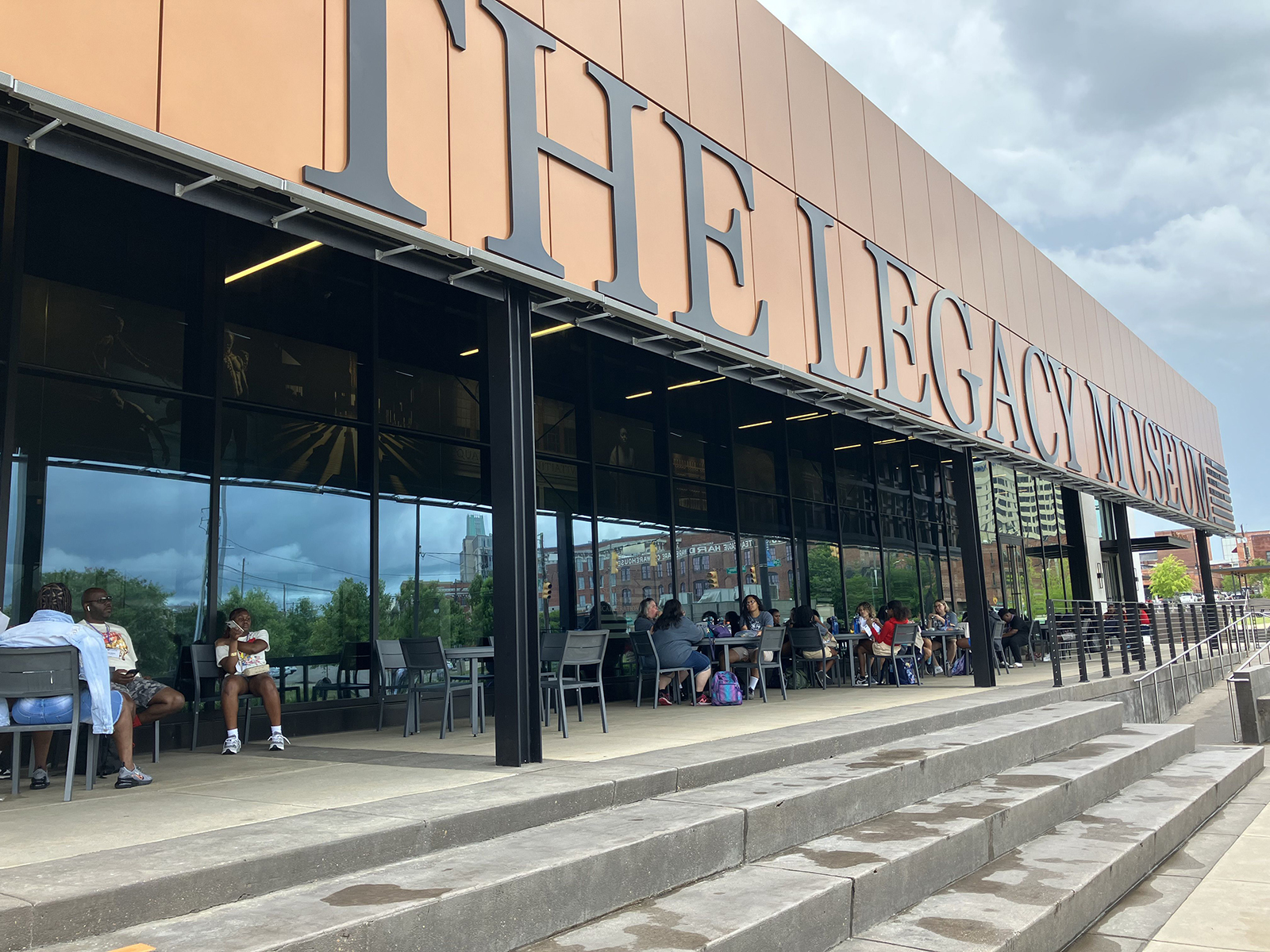
“We had all of these markers and monuments and streets and schools and statues dedicated to leaders of the Confederacy,” Stevenson said. “And I didn’t think it was accurate to talk about that period in Alabama history and American history without acknowledging the role of slavery and the burden of enslavement for so many people.”
The National Memorial grew out of EJI’s work to document the deaths of thousands by lynching between 1877 and 1950. Stevenson said the museum was intended as a space to provide more context.
“But the ambition at that time was relatively small,” Stevenson said. “And I’ve been blown away by the response. I did not imagine that we’d see a half-million people a year want to come to these sites.
“And the growth since then has largely been a consequence of trying to manage and accommodate the level of interest that those initial sites generated.”
Stevenson said the original museum had limited capacity, so some visitors who came for the day did not get in. That led to the new museum, which has more capacity and content.
“But now that we can accommodate a couple of thousand people a day, that creates new demands with moving people,” Stevenson said. “So we had to get shuttles, because we need to do transportation, and now we have a restaurant. And we’re going to open two more by the end of the year because people need a place to eat. And so a lot of what we’re doing is just trying to create an infrastructure that allows the visits that people have to be meaningful and comprehensive and complete.”
“Somebody flies all the way from the West Coast or from another country to be here, we want them to be really inspired by their time in Montgomery.”
Crime A Threat To Tourism
David Bronner, as CEO of Retirement Systems of Alabama for more than 50 years, has spearheaded changes in downtown Montgomery for decades, leading the development of RSA office buildings, the Renaissance Hotel complex and performing arts center, and ongoing projects, including the construction of a new State House for the Alabama Legislature. Bronner has high praise for what Stevenson and EJI have built.
“It’s really fantastic,” Bronner said. “It’s rather disturbing, to say the least, but at the same time fantastic to recognize history as it was. These are real people with real facts. Not just, ‘Let’s forget about it.’ I think he’s done an unbelievable job.”
Bronner said he has only talked to Stevenson once or twice and told him there is so much to see in the exhibits that it is hard to take them all in.
“The stories and the cruelty to fellow man was quite unbelievable,” Bronner said.
Bronner said the EJI projects amount to reclamations of three areas of downtown and said they complement the RSA’s developments, as well as the establishment of Montgomery Whitewater, a park for rafting and outdoor recreation that was supported by the city of Montgomery and the Montgomery County Commission.
While projects like the EJI sites and Montgomery Whitewater are bright spots, Montgomery is dealing with growing alarm over a rise in gun violence. Nine people were injured by gunfire at a large party in north Montgomery in June. A father, son, and a third man died in a shooting at an Hispanic grocery store in early June. A 43-year-old wife and mother was badly injured by stray gunfire while stopped at a traffic light on a busy stretch of the Atlanta Highway on an early afternoon in April. The police department is understaffed and has had problems hiring and keeping officers.
“The danger to tourism is that the city becomes so rough with the lack of enforcement that you do lose the tourists,” Bronner said. “You can’t have gun battles in the city all the time without putting tourism at a serious risk.”
Montgomery Mayor Steven Reed has called for more spending on public safety, including pay raises for police to improve hiring and retention.
“You’ve just got to make Montgomery for law enforcement salary-wise and staffing-wise as good as there is in the state,” Bronner said. “If you’re going to keep tourism to the level that tourists want to come, they have to feel safe.”
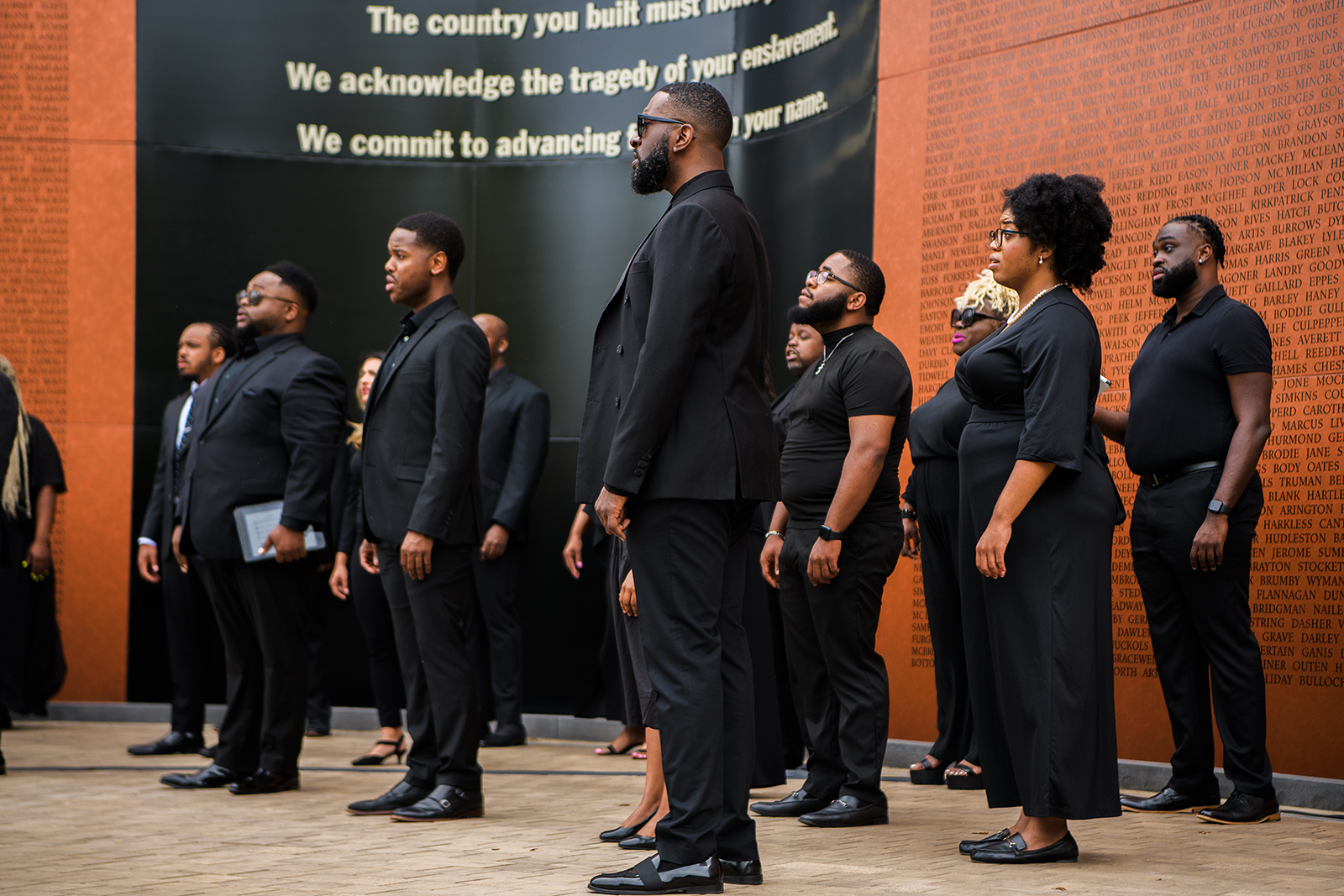
Not Just Fireworks And Hotdogs
Lee Sentell, director of Alabama Tourism Department since Gov. Bob Riley’s administration, said the quality and scope of EJI’s projects is hard to match.
“I can’t think of another organization in the last 20 years that has come into the state and developed such an amazing footprint within a downtown of any city in the state,” Sentell said. “They have generated high quality educational destinations that any state in the country would be happy to host.”
“They have done an amazing job in bringing people to Alabama who probably never had a specific reason to visit,” Sentell said.
Justin and Rachel Lonas of Chattanooga stopped in Montgomery on their way to the beach last Sunday and toured the Legacy Museum with their four daughters, ages 6 to 14.
Lonas said he was familiar with EJI’s work but it was his first chance to tour the museum.
“It’s incredibly well done,” Lonas said. “You really appreciate how they manage to tell a single story. From the slave trade, through enslavement, through Jim Crow, through mass incarceration, it’s just one long story. And it’s really well articulated.”
Lonas said the museum carries important lessons for his daughters and other young people.
“I just hope they know the whole story of America, that it’s not all fireworks and hot dogs,” Lonas said. “It’s a complicated history that’s full of evil and injustice as well as the good things.
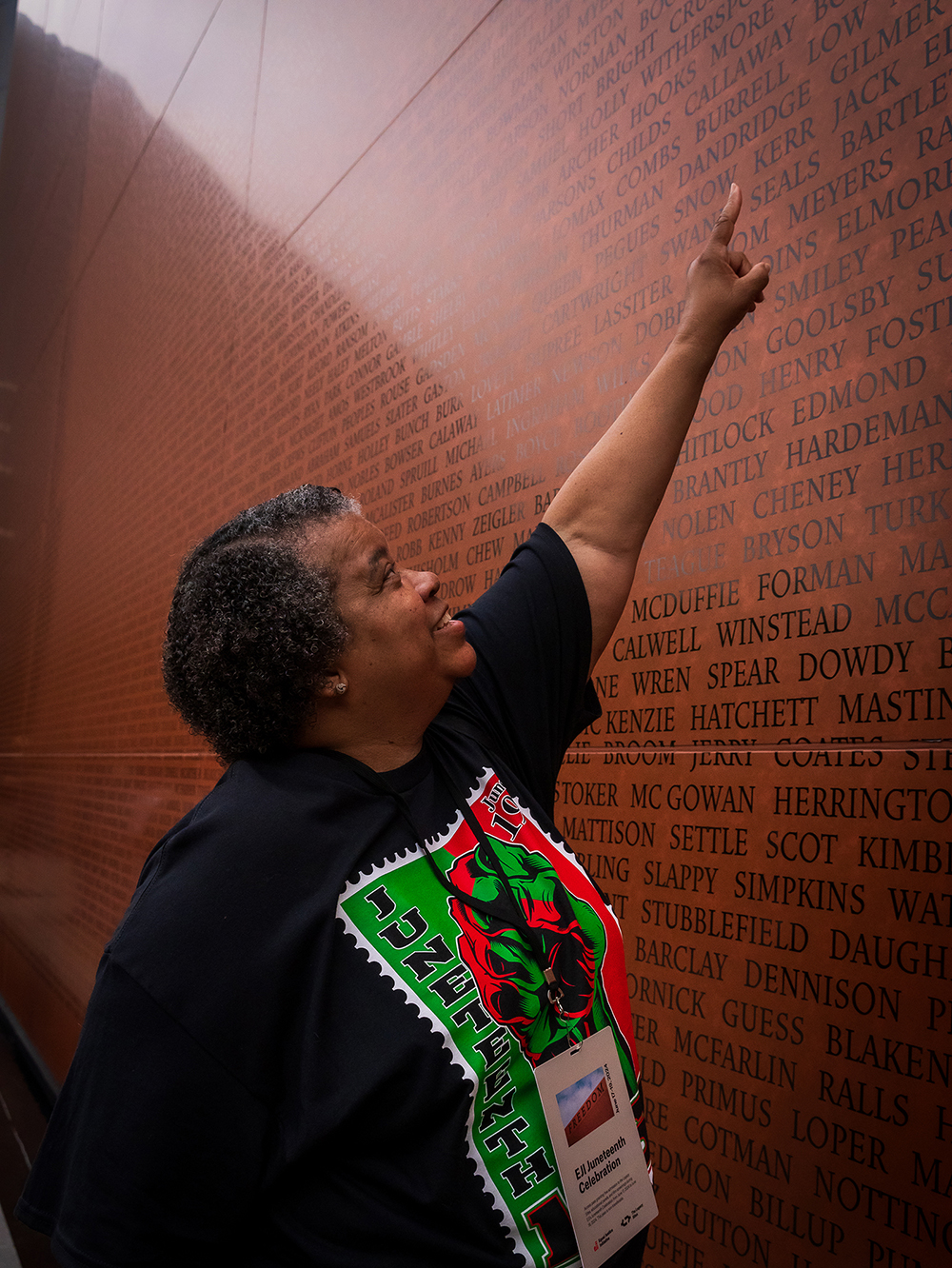
“If we’re going to grow into the country that’s better than we are it requires everybody’s participation and work together, and knowing the past is part of that,” Lonas said.
His oldest daughter, Canaan Lonas, 14, said the unvarnished truths presented by the museum were not easy to take but are important.
“They said the whole thing, from the transatlantic slave trade to the actual enslavement period and all the different kinds of injustice that have gone on as long as America has been around,” Canaan said. “And it was very raw, very honest. And I appreciate that because you don’t hear those stories as often as you probably should. It’s hard to take. It’s hard to take learning all of that about America.”
Anthony Fowler of Montgomery walked through Legacy Plaza last Sunday to see the new statues of Rosa Parks and Martin Luther King Jr. Fowler, 56, who grew up in New Jersey, said the opening of the National Memorial and the Legacy Museum six years ago came on his wife’s birthday, April 27. Fowler remembers the concert that night on the riverfront, where Stevie Wonder, Kirk Franklin, Usher, the Roots, Brittany Howard and others performed.
“There is a lot of history in our city, history that people might not have known about,” Fowler said. “Even people that live here, grew up here, might not have known about some of the history. Things you might not learn in school, you can learn across the street.
“And how everything was connected, from slavery, to the lynching and to mass incarceration. I didn’t know how it all fit in. But it tells you in there how it all comes together. And it’s something. It’s something.”
Affordable And Easy Access
Stevenson said the National Memorial and Legacy Museum were on pace to attract about 500,000 visitors a year when the pandemic came, shutting down the sites and bringing travel and tourism to a halt.
He said the rate of visitors has returned to the pre-pandemic pace and possibly exceeded it, with the Sculpture Park providing a third major installation.
Stevenson said the expansion has mostly been funded by growing donations to EJI. As for revenue from the legacy sites themselves, he said the goal has been to operate them at close to cost.
Tickets to the sites are $5 for adults and free for children 6 and under. The EJI provides free shuttle service between the three sites.
“We have always wanted access to the sites to be easy,” Stevenson said. “And so we’ve never had an admission price that would allow us to make money on the sites.
“It has exposed us, the work of EJI, to a larger audience. And many of those people have become donors of our work because they value the work. And we’ve been able to increase our resources that way. We see it as public education work more than as revenue generating.”
Stevenson’s book, “Just Mercy: A Story of Justice and Redemption,” published in 2014, was developed into a movie starring Michael B. Jordan and Jamie Foxx.
“We have benefited by more people learning about our work,” Stevenson said.
Stevenson said the economic benefits of the EJI sites are exciting.
“I’m really happy that we’ve been able to contribute to creating jobs for hundreds of people, either directly or indirectly, is something I love to see,” Stevenson said.
For more on the EJI memorials, visit www.eji.org




